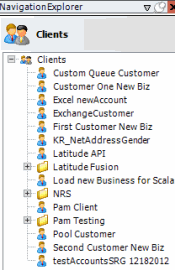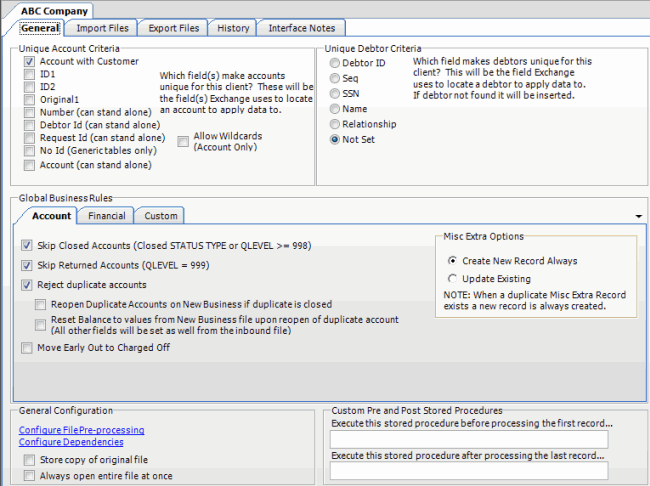- Contents
Exchange Manager Help
Specify Unique Debtor Criteria
Use the Unique Debtor Criteria section of the General tab to specify the criteria to use to locate the debtors to update in Latitude. Exchange uses this criteria along with the unique account criteria you specified to locate the correct debtor record to update. If Exchange Manager doesn't locate the debtor, it inserts a new debtor record.
To specify unique debtor criteria
-
In the Navigation pane, click Clients.

-
In the Clients pane, expand the appropriate folder and then double-click the client. The tab for the specified client appears in the Information pane.

Debtor ID: If selected, Exchange uses the debtor ID to locate the debtor record to update. If you select this option, select the Debtor ID check box in the Unique Account Criteria section also. Recommended as the most accurate method to locate the correct debtor.
Seq: (Sequence) If selected, Exchange Manager combines the debtor sequence number with the unique account criteria to locate the debtor record to update. The sequence number for the primary debtor is 0 (zero) and the sequence number for secondary debtors is 1 (one) or higher.
Note: Use with caution. More than one of the same sequences can exist for a debtor record with the same Latitude file number.
SSN: If selected, Exchange Manager uses the debtor's social security number and the unique account criteria to locate the debtor record to update.
Name: If selected, Exchange Manager uses the customer's name and the unique account criteria to locate the customer record to update. The format is last name, first name, middle initial (for example, "Doe, John E"). If the customer (debtor) ID isn't available, the name is the second most accurate method to locate a customer record.
Relationship: If selected, Exchange Manager uses the account relationship and the unique account criteria to locate the customer record to update.
Note: Use with caution. More than one of the same relationships can exist for a customer record with the same Latitude file number.
Not Set: (default) If selected, Exchange Manager doesn't map secondary information for a debtor. For example, it only maps to new business. If you select this option:
-
Exchange Manager applies new business information to the primary debtor, unless new debtor rows exist in the mapping and you mapped debtor information to the additional rows.
-
Maintenance requires debtor mapping; otherwise, Exchange Manager could insert a new debtor record.
-
Bankruptcy and deceased records require debtor mapping to match the information to the correct debtor.
Note: Ensure that you map the unique debtor criteria from your source file to a destination field. For more information, see Map Source Fields to Destination Fields.
-
Select one criteria that renders debtors unique for the specified customer and then, in the toolbar, click Save. The Update Comment dialog box appears.
-
In the Update Comment box, type a comment regarding your changes and then click OK.



